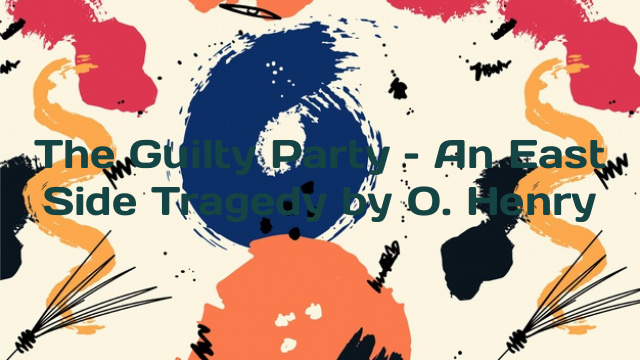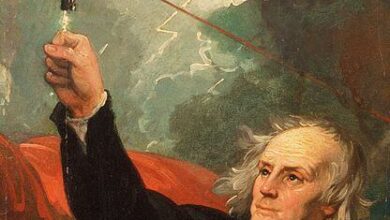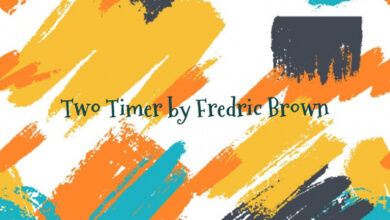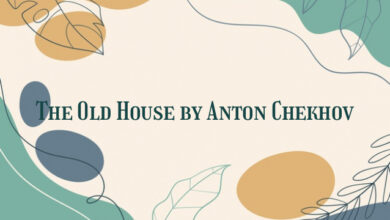
The Guilty Party – An East Side Tragedy by O. Henry
A Red-haired, unshaven, untidy man sat in a rocking chair by a window. He had just lighted a pipe, and was puffing blue clouds with great satisfaction. He had removed his shoes and donned a pair of blue, faded carpet-slippers. With the morbid thirst of the confirmed daily news drinker, he awkwardly folded back the pages of an evening paper, eagerly gulping down the strong, black headlines, to be followed as a chaser by the milder details of the smaller type.
In an adjoining room a woman was cooking supper. Odors from strong bacon and boiling coffee contended against the cut-plug fumes from the vespertine pipe.
Outside was one of those crowded streets of the east side, in which, as twilight falls, Satan sets up his recruiting office. A mighty host of children danced and ran and played in the street. Some in rags, some in clean white and beribboned, some wild and restless as young hawks, some gentle-faced and shrinking, some shrieking rude and sinful words, some listening, awed, but soon, grown familiar, to embrace–here were the children playing in the corridors of the House of Sin. Above the playground forever hovered a great bird. The bird was known to humorists as the stork. But the people of Chrystie street were better ornithologists. They called it a vulture.
A little girl of twelve came up timidly to the man reading and resting by the window, and said:
“Papa, won’t you play a game of checkers with me if you aren’t too tired?”
The red-haired, unshaven, untidy man sitting shoeless by the window answered, with a frown.
“Checkers. No, I won’t. Can’t a man who works hard all day have a little rest when he comes home? Why don’t you go out and play with the other kids on the sidewalk?”
The woman who was cooking came to the door.
“John,” she said, “I don’t like for Lizzie to play in the street. They learn too much there that ain’t good for ’em. She’s been in the house all day long. It seems that you might give up a little of your time to amuse her when you come home.”
“Let her go out and play like the rest of ’em if she wants to be amused,” said the red-haired, unshaven, untidy man, “and don’t bother me.”
“You’re on,” said Kid Mullaly. “Fifty dollars to $25 I take Annie to the dance. Put up.”
The Kid’s black eyes were snapping with the fire of the baited and challenged. He drew out his “roll” and slapped five tens upon the bar. The three or four young fellows who were thus “taken” more slowly produced their stake. The bartender, ex-officio stakeholder, took the money, laboriously wrapped it, recorded the bet with an inch-long pencil and stuffed the whole into a corner of the cash register.
“And, oh, what’ll be done to you’ll be a plenty,” said a bettor, with anticipatory glee.
“That’s my lookout,” said the “Kid,” sternly. “Fill ’em up all around, Mike.”
After the round Burke, the “Kid’s” sponge, sponge-holder, pal, Mentor and Grand Vizier, drew him out to the bootblack stand at the saloon corner where all the official and important matters of the Small Hours Social Club were settled. As Tony polished the light tan shoes of the club’s President and Secretary for the fifth time that day, Burke spake words of wisdom to his chief.
“Cut that blond out, ‘Kid,'” was his advice, “or there’ll be trouble. What do you want to throw down that girl of yours for? You’ll never find one that’ll freeze to you like Liz has. She’s worth a hallful of Annies.”
“I’m no Annie admirer!” said the “Kid,” dropping a cigarette ash on his polished toe, and wiping it off on Tony’s shoulder. “But I want to teach Liz a lesson. She thinks I belong to her. She’s been bragging that I daren’t speak to another girl. Liz is all right–in some ways. She’s drinking a little too much lately. And she uses language that a lady oughtn’t.”
“You’re engaged, ain’t you?” asked Burke.
“Sure. We’ll get married next year, maybe.”
“I saw you make her drink her first glass of beer,” said Burke. “That was two years ago, when she used to came down to the corner of Chrystie bare-headed to meet you after supper. She was a quiet sort of a kid then, and couldn’t speak without blushing.”
“She’s a little spitfire, sometimes, now,” said the Kid. “I hate jealousy. That’s why I’m going to the dance with Annie. It’ll teach her some sense.”
“Well, you better look a little out,” were Burke’s last words. “If Liz was my girl and I was to sneak out to a dance coupled up with an Annie, I’d want a suit of chain armor on under my gladsome rags, all right.”
Through the land of the stork-vulture wandered Liz. Her black eyes searched the passing crowds fierily but vaguely. Now and then she hummed bars of foolish little songs. Between times she set her small, white teeth together, and spake crisp words that the east side has added to language.
Liz’s skirt was green silk. Her waist was a large brown-and-pink plaid, well-fitting and not without style. She wore a cluster ring of huge imitation rubies, and a locket that banged her knees at the bottom of a silver chain. Her shoes were run down over twisted high heels, and were strangers to polish. Her hat would scarcely have passed into a flour barrel.
The “Family Entrance” of the Blue Jay Cafe received her. At a table she sat, and punched the button with the air of milady ringing for her carriage. The waiter came with his large-chinned, low-voiced manner of respectful familiarity. Liz smoothed her silken skirt with a satisfied wriggle. She made the most of it. Here she could order and be waited upon. It was all that her world offered her of the prerogative of woman.
“Whiskey, Tommy,” she said as her sisters further uptown murmur, “Champagne, James.”
“Sure, Miss Lizzie. What’ll the chaser be?”
“Seltzer. And say, Tommy, has the Kid been around to-day?”
“Why, no, Miss Lizzie, I haven’t saw him to-day.”
Fluently came the “Miss Lizzie,” for the Kid was known to be one who required rigid upholdment of the dignity of his fiancee.
“I’m lookin’ for ‘m,” said Liz, after the chaser had sputtered under her nose. “It’s got to me that he says he’ll take Annie Karlson to the dance. Let him. The pink-eyed white rat! I’m lookin’ for ‘m. You know me, Tommy. Two years me and the Kid’s been engaged. Look at that ring. Five hundred, he said it cost. Let him take her to the dance. What’ll I do? I’ll cut his heart out. Another whiskey, Tommy.”
“I wouldn’t listen to no such reports, Miss Lizzie,” said the waiter smoothly, from the narrow opening above his chin. “Kid Mullaly’s not the guy to throw a lady like you down. Seltzer on the side?”
“Two years,” repeated Liz, softening a little to sentiment under the magic of the distiller’s art. “I always used to play out on the street of evenin’s ’cause there was nothin’ doin’ for me at home. For a long time I just sat on doorsteps and looked at the lights and the people goin’ by. And then the Kid came along one evenin’ and sized me up, and I was mashed on the spot for fair. The first drink he made me take I cried all night at home, and got a lickin’ for makin’ a noise. And now–say, Tommy, you ever see this Annie Karlson? If it wasn’t for peroxide the chloroform limit would have put her out long ago. Oh, I’m lookin’ for ‘m. You tell the Kid if he comes in. Me? I’ll cut his heart out. Leave it to me. Another whiskey, Tommy.”
A little unsteadily, but with watchful and brilliant eyes, Liz walked up the avenue. On the doorstep of a brick tenement a curly-haired child sat, puzzling over the convolutions of a tangled string. Liz flopped down beside her, with a crooked, shifting smile on her flushed face. But her eyes had grown clear and artless of a sudden.
“Let me show you how to make a cat’s-cradle, kid,” she said, tucking her green silk skirt under her rusty shoes.
And while they sat there the lights were being turned on for the dance in the hall of the Small Hours Social Club. It was the bi-monthly dance, a dress affair in which the members took great pride and bestirred themselves huskily to further and adorn.
At 9 o’clock the President, Kid Mullaly, paced upon the floor with a lady on his arm. As the Loreley’s was her hair golden. Her “yes” was softened to a “yah,” but its quality of assent was patent to the most Milesian ears. She stepped upon her own train and blushed, and–she smiled into the eyes of Kid Mullaly.
And then, as the two stood in the middle of the waxed floor, the thing happened to prevent which many lamps are burning nightly in many studies and libraries.
Out from the circle of spectators in the hall leaped Fate in a green silk skirt, under the nom de guerre of “Liz.” Her eyes were hard and blacker than jet. She did not scream or waver. Most unwomanly, she cried out one oath–the Kid’s own favorite oath–and in his own deep voice; and then while the Small Hours Social Club went frantically to pieces, she made good her boast to Tommy, the waiter–made good as far as the length of her knife blade and the strength of her arm permitted.
And next came the primal instinct of self-preservation–or was it self-annihilation, the instinct that society has grafted on the natural branch?
Liz ran out and down the street swift and true as a woodcock flying through a grove of saplings at dusk.
And then followed the big city’s biggest shame, its most ancient and rotten surviving canker, its pollution and disgrace, its blight and perversion, its forever infamy and guilt, fostered, unreproved and cherished, handed down from a long-ago century of the basest barbarity–the Hue and Cry. Nowhere but in the big cities does it survive, and here most of all, where the ultimate perfection of culture, citizenship and alleged superiority joins, bawling, in the chase.
They pursued–a shrieking mob of fathers, mothers, lovers and maidens–howling, yelling, calling, whistling, crying for blood. Well may the wolf in the big city stand outside the door. Well may his heart, the gentler, falter at the siege.
Knowing her way, and hungry for her surcease, she darted down the familiar ways until at last her feet struck the dull solidity of the rotting pier. And then it was but a few more panting steps–and good mother East River took Liz to her bosom, soothed her muddily but quickly, and settled in five minutes the problem that keeps lights burning o’ nights in thousands of pastorates and colleges.
It’s mighty funny what kind of dreams one has sometimes. Poets call them visions, but a vision is only a dream in blank verse. I dreamed the rest of this story.
I thought I was in the next world. I don’t know how I got there; I suppose I had been riding on the Ninth avenue elevated or taking patent medicine or trying to pull Jim Jeffries’s nose, or doing some such little injudicious stunt. But, anyhow, there I was, and there was a great crowd of us outside the courtroom where the judgments were going on. And every now and then a very beautiful and imposing court-officer angel would come outside the door and call another case.
While I was considering my own worldly sins and wondering whether there would be any use of my trying to prove an alibi by claiming that I lived in New Jersey, the bailiff angel came to the door and sang out:
“Case No. 99,852,743.”
Up stepped a plain-clothes man–there were lots of ’em there, dressed exactly like preachers and hustling us spirits around just like cops do on earth–and by the arm he dragged–whom, do you think? Why, Liz!
The court officer took her inside and closed the door. I went up to Mr. Fly-Cop and inquired about the case.
“A very sad one,” says he, laying the points of his manicured fingers together. “An utterly incorrigible girl. I am Special Terrestrial Officer the Reverend Jones. The case was assigned to me. The girl murdered her fiance and committed suicide. She had no defense. My report to the court relates the facts in detail, all of which are substantiated by reliable witnesses. The wages of sin is death. Praise the Lord.”
The court officer opened the door and stepped out.
“Poor girl,” said Special Terrestrial Officer the Reverend Jones, with a tear in his eye. “It was one of the saddest cases that I ever met with. Of course she was”–
“Discharged,” said the court officer. “Come here, Jonesy. First thing you know you’ll be switched to the pot-pie squad. How would you like to be on the missionary force in the South Sea Islands–hey? Now, you quit making these false arrests, or you’ll be transferred–see? The guilty party you’ve not to look for in this case is a red-haired, unshaven, untidy man, sitting by the window reading, in his stocking feet, while his children play in the streets. Get a move on you.”
Now, wasn’t that a silly dream?




